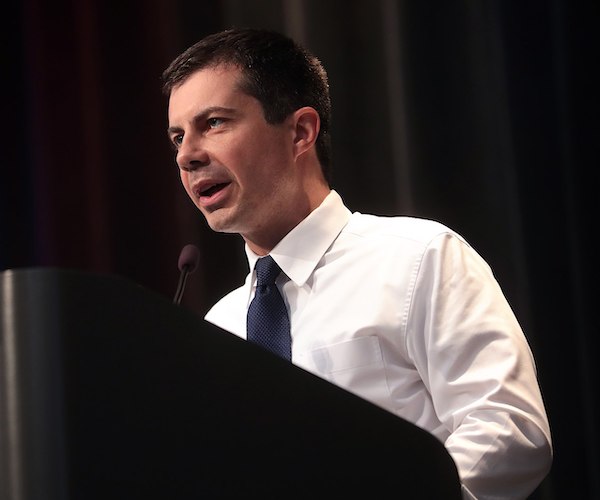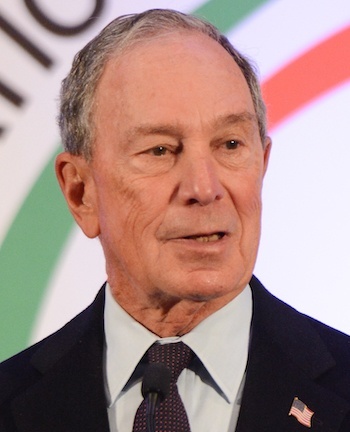Arts Commentary: Politics IS Performance — A Director Evaluates the Candidates
By Jeff Zinn
Politicians are forced to perform on a massive stage and under the fierce gaze of a thousand lenses, yet few have real skills in that arena.

Pete Buttigieg — a natural performer in front of the lens. Photo: Wiki Commons.
We’re all pundits now. I know I’m guilty of obsessively consuming too much cable news/opinion/analysis. My DVR is stacked with Morning Joe and Mika, Nicole, Chuck, the Chrises (Hayes and Matthews) Joy, Rachel, Lawrence, and Brian. I even have Fox and Friends for “balance” (although I have a hard time watching it.) We knowingly speak of lanes and tracking averages; on Facebook and Twitter we prognosticate about electability. Yes, I’m a Facebook warrior and regret that I don’t have the time or energy to hit the streets, march on Washington, storm the barricades. I deeply admire those who can and do.
Even on Facebook I try hard to restrain myself and not post every impulsive reaction to each Trump/Barr outrage, holding myself to a simple test: is what I’m about to say contributing something new to the conversation? Considering that almost everything worth saying has already been said, that usually stops me in my tracks. I hope that the following may add some small new insight into what we have all been observing.
Maybe it’s an occupational hazard, but I tend to view politicians, and especially the current crop of contenders for the Democratic nomination, through the lens of performance. As a director I’ve watched thousands of actors audition; it’s a truism in the field that you can tell whether or not someone is of interest within the first 60 seconds. An ineffable combination of presence, intelligence, connection, physicality, the sound of the voice, and a dozen other indicators, most of which are registering on a subconscious level, all contribute to a visceral reaction in the auditor, positive or negative. There are times when the person has all the right qualities on paper (they went to Yale!) but falls short in some unquantifiable way. Other times they’re completely wrong for the role and yet you feel compelled to use them, even if for a different role in the same play. Occasionally they force you to rethink the role completely.
And so it is with the candidates. We wanted to like Kamala Harris – a woman of color with an impressive resume – and yet, at least to my eye, there was something that didn’t quite ring true in her performance; something frozen in her smile. Harsh? Yes. But politics ain’t beanbag All of us, consciously or not, are sizing up the candidates in this way, and their relative strengths and weaknesses as performers will have a great deal to do with their success or failure when it comes to the vote.

Bernie Sanders — when he speaks, the stakes are existential. Photo: Wiki Commons.
Politics IS performance. Politicians are forced to perform on a massive stage and under the fierce gaze of a thousand lenses, yet few have real skills in that arena. Their media interlocutors have the advantage; they all have training and I suspect some are former theater kids (I know this for a fact about Chris Hayes) so, as I go along, I will subject them to some scrutiny as well.
Much is made of the fact that Ronald Reagan was an actor before turning to politics. But Reagan was a pretty bad actor with a roster of mostly mediocre films to his credit. The only truly great actor to succeed in politics has been Glenda Jackson. The really good actors who have portrayed presidents – Cherry Jones, Elizabeth Marvel, Daniel Day Lewis, Anthony Hopkins, Martin Sheen, and many more – have, perhaps wisely, opted to keep their day jobs.
This cycle’s crop of Democrats is uneven at best. But first, Donald Trump.
Trump has several performance modes, all of which fall into what Patsy Rodenburg (legendary acting/speech guru) would call “third circle,” that is, the circle of “bluff and force.” You can see this at work in those press “sprays” when he’s walking to the helicopter and reporters pepper him with questions. Watch the hand motions that shut down the questioner. Negate. Assert. Obnoxious, but effective in controlling the message. The mode that drives us all crazy, though, is the schtick he employs at his rallies. There Trump becomes a stand-up comedian, a combination of Rodney Dangerfield and Jackie Mason. Rodenburg might cringe at this, but in the rally environment he approaches the “second circle,” which she describes as, “living in a two-way street — you give to and are responsive to that energy, reacting and communicating freely. You are in the moment — in the so-called ‘zone’ — and moment to moment you give and take.” What he/they give and take is horrible, reprehensible, but nevertheless…
The pejorative that comes to mind for many of the candidates is “canned.” Of course, they all are forced to answer the same questions and regurgitate the same answers countless times. But is that any different than the actor who must recite the same lines, word for word, for the run of the show? How do they manage to make it appear that this is the FIRST time they are saying that line? In acting terms, it is a matter of being completely present in the moment, deeply knowing your intention, placing attention on the other, and allowing your own emotion – passion – to fuel the delivery. Some politicians grasp all of that intuitively. Others miss the mark.

Elizabeth Warren — She speaks with passion and her message is strong. Photo: Wiki Common.
Elizabeth Warren suffers most from this defect. She speaks with passion and her message is strong. But this isn’t about message, it’s about affect. She tends to pivot away from tough questions into well-worn stories and talking points which come off as, well, canned.
Amy Klobuchar seems to be gaining traction these days, and I like a lot of what she has to say. She has a sunny demeanor and her midwestern charm goes a long way toward helping her performance, but I find her tense and tight. I believe it was in the first debate that an unfortunate confluence of nerves and hairspray added up to a twitching of bangs that was disastrously distracting.
Bernie is brilliant. His overriding quality, always, is his passion. He burns with intentionality. When he speaks, the stakes are existential. His shape – the easily caricatured rumple – makes the point that his exterior is irrelevant to the message, which makes the message all the more effective.
Buttigieg is a natural performer in front of the lens. I’m in awe of his ability to respond to seemingly any question with a well thought out, perfectly formulated answer which, though you know he’s said it a hundred times, somehow still has the quality of spontaneity. You can tell he’s thought hard about the issues and has developed a coherent world view, so the words flow easily for him. That ease appeals to voters and is part of the reason he’s been building from the start and is now a legit front runner. His weakness is what you might call his unbearable lightness of being. I’ve noticed that, when it comes to actors taking on roles that are different from themselves, it’s much harder to add weight than to lighten it. So, his small stature and boyish appearance work against him. He does best in intimate settings – on the set of an interview show or in a town hall – but on the debate stage you can sense him trying to “bulk up” and put on a serious face. It doesn’t work. He should just relax and be himself.

Mike Bloomberg — Will voters look past that lack of charisma? Photo: Wiki Commons.
Mike Bloomberg never seems to be trying very hard to project anything in particular. This is what Rodenburg calls “first circle” where, “…the energy you generate falls back into you… You can come across to others as self-centered, uncaring and withdrawn…” I suppose that’s what happens when you’re REALLY rich and don’t much care what others think of you. But we are drawn to charismatic leaders who inspire. Will voters look past that lack of charisma?
Shifting to another quadrant of the landscape, I’ll observe that Nicole Wallace and Rachel Maddow are the most gifted of the cable hosts today, and in different ways. I can’t decide whether Rachel’s monologues are scripted or not. If scripted, she does an amazing job of reading them as if they were impromptu. If impromptu, then damn, she’s REALLY good. Nicole believably conveys the sense that she’s gathered together her “favorite reporters and friends” as she says and is having a really intelligent conversation that we are privileged to witness. On camera her objective comes across as wanting to extract the information and opinion from her guests, not to entertain or impress us. Somehow the “performance” in all this is absent, which makes it all the better.
Other standouts in this medium: I’m thankful that we can still experience Brian Williams’s dry sense of humor on the late-night slot to which he’s been banished. (Remember how he lost the NBC nightly news because he embellished a journalistic war story? How quaint!) Lester Holt is robotic. Chuck Todd is empty. Margaret Brennan is quite good. Steve Schmidt’s jeremiads are always compelling.
A director gets to choose his cast. We the people have much less control. Candidates are crowdsourced and, as such, the collective consciousness – you could call it Jungian – operates on a number of levels, many of which are subconscious. So, while we tend to size up candidates as if we were ordering a meal in a restaurant – I want these ingredients, but not those – I would suggest that we take a more strategic approach. Mostly we should aspire to leave behind the petulant foot stomping that accompanies NOT getting our way. The crowd, our crowd, is almost always right. Prepare to hold noses.
Jeff Zinn is best known as the former Artistic Director of Wellfleet Harbor Actors Theater (WHAT) and the author of The Existential Actor: Life and Death, Onstage and Off (Smith and Kraus, 2015),
Tagged: Amy Klobuchar, Bernie Sanders, Donald Trump, Elizabeth Warren, Jeff Zinn, Kamala Harris, Mike Bloomberg

Keep writing Jeff. You have an exceptional “auditor’s” eye and mind for performance AND politics. You are YOU – and your brilliant father’s son.
Never thought of an audition relating to a financial or forensic or any other kind of auditor – but of course the ones who hear/observe/experience how the performer/actor/politician are exactly that – auditors. They take it all in and analyze it.
STILL don’t know for whom I will vote – the one with whose politics I most align , the one those whose views I respect think can beat Trump, Fate, 538? I fear we’ve lost the Presidency to our own foot and mouth -and the DNC’s ineptitude – disease – but we MUST take the Senate and House. Yes, I’m worn down
Thank you Gail. Keep the faith!
This is an outstanding piece. And I am so proud it’s in Arts Fuse.
Excellent, fresh and insightful take on the candidates and what may contribute to their appeal or lack thereof. Thank you!
This is a great article. We all need a strong dope slap about what we want in a leader. I care about experience and approach to transforming our system to work for most of the citizens. Considering the current part time occupant of the White House, I am strongly opposed to voting for a performance artist…
I’ve always wrestled w the notion that our ever expanding media has tainted our political process and our politicians towards the “ready for prime time “ mode of being. Joe Biden’s hair replacement was a necessity if he were to continue in politics. The first hurdle of the political career is simply how does one look. How compelling is the way one speaks, defends and attacks. It is all superficial nonsense. Could FDR be elected today as a handicapped man? Would Lincoln’s looks hold him back? And Nixon’s as well? We are so busy judging the look and tenor of the candidate that their true message is rarely even spoken and even more rarely heard.
[…] “Maybe it’s an occupational hazard, but I tend to view politicians, and especially the current crop of contenders for the Democratic nomination, through the lens of performance. As a director I’ve watched thousands of actors audition; it’s a truism in the field that you can tell whether or not someone is of interest within the first 60 seconds.” – ArtsFuse […]
Thank you for writing this, Mr. Zinn, and for sharing it on Artsfuse, Mr. Marx. I found it to be an insightful observation about/analysis of our current candidates (as well as a few of our pundits). I once sat as an auditor during the Stagesource annual auditions and became very aware of the truth/power of this particular paragraph: “As a director I’ve watched thousands of actors audition; it’s a truism in the field that you can tell whether or not someone is of interest within the first 60 seconds. An ineffable combination of presence, intelligence, connection, physicality, the sound of the voice, and a dozen other indicators, most of which are registering on a subconscious level, all contribute to a visceral reaction in the auditor, positive or negative.” This paragraph explains my experience when I first heard Mayor Pete speak in an interview with George Stephanopoulos many months ago (and immediately started donating a modest monthly sum to his campaign). Since then I have added many other candidates — both presidential and senatorial — to my list of modest monthly donations and am looking forward to consolidating my presidential campaign support behind whomever wins the Democratic nomination. I have also shared your article/analysis on Facebook. It deserves a wide readership!
It’s rare to read something about the primaries/election that has a new and fresh take on the subject, and is also smart. I enjoyed this very much and think it is spot on about each of the candidates.